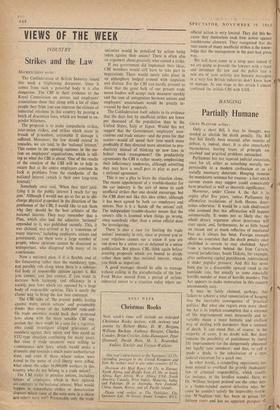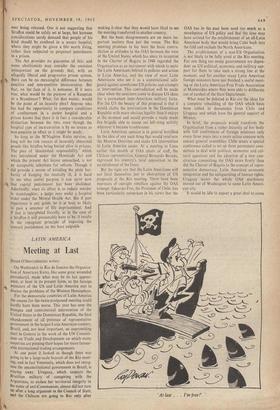HANGING
Partially Humane
GILES PLAYFAIR writes :
Only a short Bill, it may be thought, was needed to abolish the death penalty. The Bill that has finally been enacted, after months of debate, is, indeed, short. It is also remarkably inconclusive, leaving issues of principle unr resolved and practical problems untouched.
Parliament has not rejected judicial execution, once for all, either as something morally im- permissible in a modern civilisation or as a• socially necessary deterrent. Hanging remains the mandatory sentence for treason : a fact which current events may suggest could conceivably 4.7 have practical as well as theoretic significance.
Moreover, . under Clause 4, the Act is to expire after five years, `unless Parliament by
affirmative resolutions of both Houses deter- mines otherwise.' It would be a rash abolitionist who assumed that this affirmation will happen automatically. It seems just as likely that the whold dreary argument about deterrence will start again, and, furthermore, be as little based on reason and as much reflective of emotional bias as it always has been. Foreign example offers no assurance that the death penalty once abolished is certain to stay abolished. Apart from a turn-about behind the Iron Curtain, several jurisdictions, South Dakota, for example, after outlawing capital punishment, reintroduced it under popular pressure. And this has never been due to a discernible upward trend in the homicide rate, but usually to some especially horrific murder or wave of horrific murders: The Act appears to make restoration in this country uncommonly easy.
It may be fairly claimed, perhaps, that failure to achieve a total renunciation of hanging was the inevitable consequence of 'practical
politics.' But what one regrets even more about the Act is its implicit assumption that a sentence.
of life imprisonment must necessarily and in- Variably mean a more humane and civilised way of dealing with murderers than a sentence of death. It can mean that, of course; in the majority of cases, it no doubt will. But there remains the possibility of punishment by literal imprisonment life mprisonment for the dangerously abnormal but legally sane murderer; and that, to call a spade a spade, is the substitution of a ...Slow judicial execution for a quick one.
In other words, a compelling opportunity...has been missed to overhaul the grossly inadequate law of criminal responsibility, which results, for instance, in the Straffen scandal. Here, as Dr. William' Sargant pointed out the other day, is a feeble-minded mental defective who, be- cause he couldn't satisfy the impossibly restric- tive M'Naghten • test, –has been in prison for thirteen years and has no apparent prospect of • la ever being released. One is not suggesting that Straffen could be safely set at large, but humane considerations surely demand that people of his kind should be confined in a secure hospital, where they might be given a life worth living, rather than subjected to perpetual punishment in a prison.
The Act provides no guarantee -of this; and some abolitionists may consider the omission unimportant on the grounds that, with an allegedly liberal and progressive prison system, there can be no meaningful difference between punitive and non punitive incarceration. But that, on the face of it, is nonsense. If it were true, what would be the purpose of a Rampton or a Broadmoor? What, for that matter, would be the point of an insanity plea? Anyone who has had the opportunity to compare conditions of confinement in a secure hospital and a prison knows that there is in fact a considerable distinction between, the two, even though the hospital type of incarceration is by no means as non-punitive in effect as it might be made.
So long as the M'Naghten Rules survive, so long will the risk remain of incurably abnormal people like Straffen being buried alive in prisons. The plea of 'diminished responsibility,' which was 'introduced under the Homicide Act and which the present Act leaves untouched, is not an acceptable substitute for reform. Though it did provide a means of avoiding the plain bar- barity of hanging the mentally ill, it is hard to see what useful purpose it can serve now that capital punishment has been abolished. AdmittedlY, since its effect is to reduce murder to manslaughter, a judge may make a. hospital 'order under the Mental Health Act. But if past experience is any guide, he is at least as likely to pass a sentence of life imprisonment. And if that is interpfeted literally, as in the case of a Straffen it will presumably have to be, it results in the repugnant principle of imposing the severest punishment on the least culpable.



































 Previous page
Previous page